
A Linux distribution is an operating system made from a software collection that includes the Linux kernel and often a package management system. Linux users usually obtain their operating system by downloading one of the Linux distributions, which are available for a wide variety of systems ranging from embedded devices and personal computers to powerful supercomputers.

Slackware is a Linux distribution created by Patrick Volkerding in 1993. Originally based on Softlanding Linux System (SLS), Slackware has been the basis for many other Linux distributions, most notably the first versions of SUSE Linux distributions, and is the oldest distribution that is still maintained.
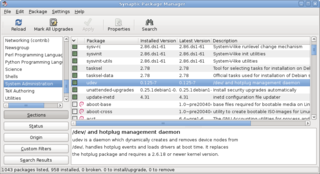
A package manager or package-management system is a collection of software tools that automates the process of installing, upgrading, configuring, and removing computer programs for a computer in a consistent manner.

The Unix philosophy, originated by Ken Thompson, is a set of cultural norms and philosophical approaches to minimalist, modular software development. It is based on the experience of leading developers of the Unix operating system. Early Unix developers were important in bringing the concepts of modularity and reusability into software engineering practice, spawning a "software tools" movement. Over time, the leading developers of Unix established a set of cultural norms for developing software; these norms became as important and influential as the technology of Unix itself, and have been termed the "Unix philosophy."

Portage is a package management system originally created for and used by Gentoo Linux and also by ChromeOS, Calculate, Sabayon, and Funtoo Linux among others. Portage is based on the concept of ports collections. Gentoo is sometimes referred to as a meta-distribution due to the extreme flexibility of Portage, which makes it operating-system-independent. The Gentoo/Alt project was concerned with using Portage to manage other operating systems, such as BSDs, macOS and Solaris. The most notable of these implementations is the Gentoo/FreeBSD project.
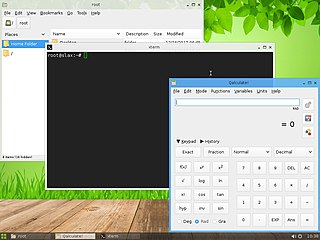
Slax is a LiveCD Linux distribution developed by Tomáš Matějíček and based on upstream customizable Linux distributions. Packages can be added by apt package manager or can be prepared as modules. The tagline for Slax refers to itself as "your pocket operating system".

Patrick Volkerding is the founder and maintainer of the Slackware Linux distribution. Volkerding is Slackware's "Benevolent Dictator for Life" (BDFL), and is also known informally as "The Man".

Within the free software and the open-source software communities there is controversy over whether to refer to computer operating systems that use a combination of GNU software and the Linux kernel as "GNU/Linux" or "Linux" systems.
ZipSlack was a specially compiled release of the Slackware Linux distribution that was designed to be lightweight and portable. It was distributed in a ZIP archive along with the Slackware release.

slapt-get is an APT-like package management system for Slackware. Slapt-get tries to emulate the features of Debian's (apt-get) as closely as possible.

VectorLinux, abbreviated VL, is a Linux distribution for the x86 platform based on the Slackware Linux distribution, originally developed by Canadian developers Robert S. Lange and Darell Stavem. Since version 7 the Standard Edition is also available for the x86-64 platform, known as VLocity64 7.

slackpkg is a software tool for installing or upgrading packages automatically through a network or over the Internet for Slackware. slackpkg was included in the main tree in Slackware 12.2 in 2008 - previously it had been included in extras/ since Slackware 9.1, which was released in 2003. It is licensed under the GNU General Public License (GPL).
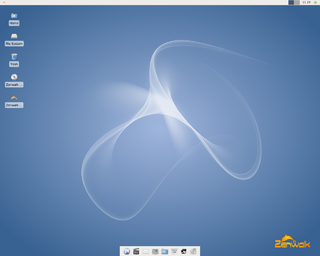
Zenwalk GNU/Linux is a desktop-focused Linux distribution founded by Jean-Philippe Guillemin. It is based on Slackware with very few modifications at system level making it 100% compatible with Slackware. It aims to be a modern, multi-purpose Linux distribution by focusing on internet applications, multimedia and programming tools. It comes with many specialized tools and is designed for beginner through advanced users, as it offers system configuration via both graphical tools and the command line.
KateOS was a Linux distribution originally based on Slackware. It was designed for intermediate users. Its package management system used so called TGZex (.tgz) packages, which unlike Slackware packages support dependency tracking (optional), internationalized descriptions, and were designed for ease of update. There were two native tools for package management: PKG and Updateos. The last version released was KateOS III (3.6), including as a Live CD, in 2007.
SUSE Linux is a computer operating system developed by SUSE. It is built on top of the free and open-source Linux kernel and is distributed with system and application software from other open source projects. SUSE Linux is of German origin, its name being an acronym of "Software und System-Entwicklung", and it was mainly developed in Europe. The first version appeared in early 1994, making SUSE one of the oldest existing commercial distributions. It is known for its YaST configuration tool.

RPM Package Manager (RPM) is a free and open-source package management system. The name RPM refers to the .rpm file format and the package manager program itself. RPM was intended primarily for Linux distributions; the file format is the baseline package format of the Linux Standard Base.

Salix OS is a multi-purpose Linux distribution based on Slackware.
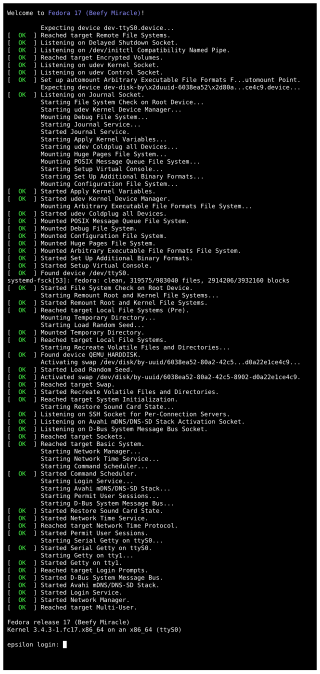
systemd is a software suite that provides an array of system components for Linux operating systems. The main aim is to unify service configuration and behavior across Linux distributions. Its primary component is a "system and service manager" – an init system used to bootstrap user space and manage user processes. It also provides replacements for various daemons and utilities, including device management, login management, network connection management, and event logging. The name systemd adheres to the Unix convention of naming daemons by appending the letter d. It also plays on the term "System D", which refers to a person's ability to adapt quickly and improvise to solve problems.
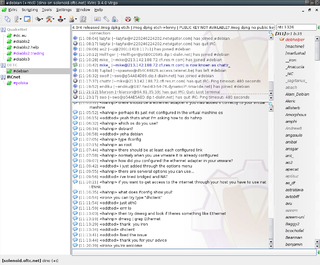
KVIrc is a graphical IRC client for Linux, Unix, Mac OS and Windows. The name is an acronym of K Visual IRC in which the K stands for a dependency to KDE, which became optional from version 2.0.0. The software is based on the Qt framework and its code is released under a modified GNU General Public License.















